The main treatment for cancer of the throat / larynx of any stage is surgery. Among malignant oncological diseases of the upper respiratory tract, throat cancer occurs in 65-70% of cases. Most often, the disease affects the men in age between 30-60 years. Recently, the number of incidence among women have also increased.
Read the article:
Surgical operations for throat cancer
Minimally invasive and reconstructive operations for throat cancer
Prognosis after surgery for throat cancer
Life after throat cancer surgery
INDICATIONS FOR THROAT CANCER OPERATION

The most effective treatment is prescribed with the correct understanding of the picture of the disease. This requires examination with the use of high-quality equipment, which allows to determine the type of tumor, size, localization, stage of development with maximum accuracy.
Malignant tumors occur as limited (T1-2) and locally advanced (T3-4). With limited throat cancer, radiation therapy, minimally invasive surgery, and laser surgery have been successfully applied. In such cases, voice and trachea functions are preserved. For cancer of the larynx T3 or T4, serious surgical intervention is required, which can lead to impaired speech function that is why reconstructive and plastic surgery is required. Before surgery, radiation is often prescribed to reduce the neoplasm. In metastases and for preventing relapse, the patient is prescribed chemotherapy and immunotherapy.
Read more in the article “Treatment of throat cancer”
SURGICAL OPERATIONS IN THROAT CANCER
The main treatment for cancer of the throat, regardless of the stage, remains surgical. With advanced stages of laryngeal cancer, the consequences after surgery may be loss of speech, the ability to breathe and to swallow normally. This scares many patients and they refuse to have surgery, which leads to decrease in life expectancy.
Modern surgery is not only aimed at eliminating the tumor, but also maximizing the preservation of the organs function of the neck (speech, breathing, swallowing). Reconstructive operations make it possible to restore the patient a normal life even after the most complex surgical procedures.
POPULAR SURGICAL PROCEDURES IN THE THROAT CANCER TREATMENT ARE:
- Tracheostomy. Required to create an alternative method of breathing, when the tumor blocks the airway or after surgery to remove the larynx. An opening (stoma) is placed in the front wall of the neck, into which a tube is inserted to ensure breathing. Temporary tracheostomy is done with laryngeal edema or after partial laryngectomy. After treatment, the tube is removed and the patient breathes in the usual way.
- Chordectomy. Partial or complete removal of the vocal cords.
- Epiglottic laryngectomy. Removal of the epiglottis.
- Hemilaryngectomy. Removal of half of the larynx (preservation of speech function is possible).
- Partial laryngectomy. Removal of part of the larynx (it is possible to preserve the speech function).
- Complete laryngectomy. Complete removal of the larynx, followed by a tracheostomy.
- Cervical dissection. Removal of metastases and lymph nodes near to the tumor.
- Thyroidectomy. Partial or complete removal of a diseased thyroid gland.
MINIMALLY INVASIVE THROAT CANCER OPERATIONS

Surgical methods are used in advanced foreign clinics for the treatment of throat cancer. The risk of complications after them is minimal.
Endoscopic surgery for cancer of the throat is a minimally invasive intervention that is considered the safest for the patient. It is used for the complete removal of small tumors in the early stages. Access to the tumor is carried out through the mouth using an endoscope with an attached micro camera, which gives image on the monitor. Thus, the surgeon removes the abnormal tissue without external incisions.
Another gentle way to resect a cancerous tumor of the throat is transoral laser microsurgery. The procedure is carried out with the help of an endoscope, only difference is that a tumor is resected using a powerful light beam. With laser surgery, there is less risk of bleeding and other complications.
RECONSTRUCTIVE THROAT CANCER OPERATIONS
Help of plastic surgeons is necessary to restore the damaged areas and functions of the organs of the neck after surgery. Reconstructive operations help patients (even with cancer of the throat in 3rd stage) to fully or partially regain the ability to breathe, swallow and talk. Muscle tissue or skin is taken from the areas close to the throat, and thanks to the innovative developments in microvascular surgery it has become possible to use the tissues of the intestines and hands. There are options for the implantation of artificial voice box, through which the ability to speak is restored in 93% of patients after laryngectomy.
RESTORATION AND REHABILITATION AFTER LARYNGEAL CANCER SURGERY
Recovery after surgery depends on the complexity of the manipulations. After surgery, the patient is placed in an intensive care unit to monitor vital signs and respiratory function. The rehabilitation program includes exercises with a physiotherapist to increase physical activity and improve breathing. The patient does special breathing and physical exercises to get rid of sputum, which often accumulates after surgery. Excess mucus is also removed by suction, which is inserted into the tube (tracheostomy).
If the patient can not eat food in a natural way after the operation a parenteral way is adopted. After the stitches heal, patient can gradually move to a prescribed diet.
Speech therapy classes are held to restore speech after the removal of the temporary tracheostomy.
PROGNOSIS OF 5-YEAR SURVIVAL AFTER THE OPERATION IN PATIENTS WITH THROAT CANCER:
LIFE AFTER THE THROAT CANCER SURGERY
Patients should be regularly examined after treatment of laryngeal cancer for 5 years to exclude recurrence, complications and the appearance of metastases. It is required to follow the recommendations of the doctors – gargling to eliminate dryness of the mucous membranes, diet, medication, care of the tube. A prerequisite for anyone who has suffered a disease is quitting smoking and alcohol.
Disability after surgery for cancer of the throat occurs only in the most difficult cases. The patient’s life usually does not change after minimally invasive surgeries, radiation or chemotherapy.





